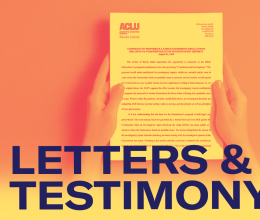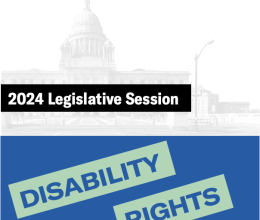The American Civil Liberties Union of Rhode Island and the R.I. Disability Law Center have today filed a federal civil rights lawsuit on behalf of a profoundly deaf person who was arrested and detained overnight in jail by Woonsocket police for allegedly making an obscene gesture, and who was never provided an interpreter to allow him to communicate with the police during his detention. The case raises important issues regarding municipal agency obligations to accommodate residents who are deaf or hard of hearing.
The lawsuit argues that city officials violated plaintiff David Alves’s “statutory and constitutional rights by unlawfully arresting and detaining him, charging him with violating an unconstitutional City criminal ordinance, subjecting him to discrimination on account of his disability, and failing to accommodate his disability.”
The arrest took place late one night last July, when Alves and some friends were at the City Side Club in Woonsocket to celebrate a friend’s birthday. After a verbal altercation between the bouncer and members of the group, police were called. On his way out of the bar, Alves gestured toward the bouncer with the American Sign Language sign for “bullshit,” which police who had arrived at the scene interpreted as giving them the middle finger. Immediately after making the gesture, Alves was arrested by the police for violating a city ordinance banning “obscene language or mak[ing] an obscene gesture.”
While being booked and held at the station overnight, Alves’s requests for a sign language interpreter were ignored. When a deaf friend came to the station to check up on him, a police officer handed the friend a note saying that Alves would “be out in the morning no problem . . . These things happen, he just needs to take it as a learning experience.” In the morning, he was released from custody and issued a summons to appear at court on the ordinance violation. A few months later, a Municipal Court judge dismissed the criminal charge.
Today’s lawsuit, filed by ACLU volunteer attorneys V. Edward Formisano, Michael Pushee and Alyse Galoski, and RI Disability Law Center attorney Katherine Bowden, raises a host of constitutional and statutory claims, including that:
* The City’s “obscene gesture” ordinance is unconstitutionally overbroad and vague in violation of the First Amendment;
* The arrest and overnight detention of Alves without cause violated his rights to due process of law and freedom from unreasonable searches and seizures; and
* The police officers’ failure to procure an interpreter or provide other means to effectively communicate with Alves violated a number of federal and state laws barring discrimination by municipal agencies on the basis of disability.
Among other remedies sought, the lawsuit asks the court to rule the “obscene gesture” ordinance unconstitutional, declare Alves’ arrest and detention unlawful, order the City to implement policies to prohibit future discrimination against deaf or hard of hearing individuals, and award Alves unspecified monetary damages for violating his rights.
Below are quotes from the participants in today’s lawsuit:
Plaintiff David Alves: “I need to fight this case so that other people don’t have to go through the same thing I went through. Deaf and hard of hearing people deserve the same dignity anyone else deserves. If they violate my civil rights, then they might feel they can violate other people’s civil rights. I want to do what I can to prevent that.”
ACLU of RI attorney V. Edward Formisano: “Mr. Alves was unlawfully arrested and detained under an unconstitutional law. To add insult to injury, he was not provided with the accommodations he needed for his obvious disability. We are confident that a court will vindicate the rights that were so unfairly denied Mr. Alves.”
RIDLC attorney Katherine Bowden: “Municipal compliance with federal and state laws prohibiting disability discrimination is mandatory, not optional. People who are deaf and hard of hearing have a right to equal access to city services, including the right to effective communication with the police and other city officials.”
ACLU of RI executive director Steven Brown: “In this country, people cannot be locked up simply in order to give them a ‘learning experience.’ We are hopeful this lawsuit will send a clear message to all law enforcement agencies that there are basic constitutional limits on the use of their formidable police powers, and that they cannot ignore their obligations under anti-discrimination laws to treat people with disabilities fairly.”
A copy of the complaint can be found here: http://www.riaclu.org/images/uploads/Alves_v_Woonsocket_complaint_FINAL.pdf






